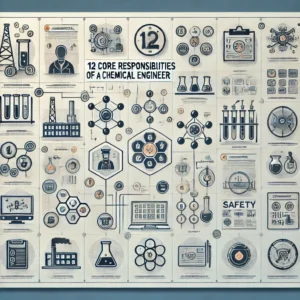A Chemical Engineer is a professional who applies principles of chemistry, physics, mathematics, and engineering to design and develop chemical processes in industries such as pharmaceuticals, energy, food, and manufacturing. They work on improving production efficiency, developing new materials, and ensuring safety in chemical operations. Chemical Engineers play a crucial role in industries that affect daily life, from producing medicines to refining oil and manufacturing consumer products.
12 Core Responsibilities of a Chemical Engineer

Reasons for Becoming a Chemical Engineer.
This field offers job stability, high salaries, and the chance to impact industries that affect daily life. Here are some key reasons why pursuing a career in Chemical Engineering is a great choice:
1. High Demand Across.
Many Industries Chemical Engineers are needed in multiple industries, including pharmaceuticals, energy, food production, environmental protection, and manufacturing. Companies rely on their expertise to develop better products, improve efficiency, and ensure safety. Since chemical processes are essential in many fields, there is a consistent demand for skilled professionals.
2. Competitive Salaries and Financial Growth.
A career in Chemical Engineering offers high earning potential. Entry-level salaries are competitive, and with experience, earnings increase significantly. Many industries provide bonuses, stock options, and benefits, making it a financially rewarding career.
3. Diverse Career Opportunities.
Chemical Engineers are not limited to one industry. They can work in:
- Petroleum and Energy – Refining oil, developing biofuels, and working on renewable energy.
- Pharmaceuticals – Creating medicines, and vaccines, and improving drug production.
- Food Processing – Designing better ways to produce and preserve food.
- Environmental Engineering – Reducing pollution and developing eco-friendly technologies.
- Materials Science – Creating new materials like biodegradable plastics and stronger metals.
4. Making a Positive Impact on Society.
Chemical Engineers play a vital role in improving human life. They help develop:
- Safer medicines that treat diseases effectively.
- Cleaner energy solutions to reduce environmental harm.
- Sustainable materials that replace harmful plastics.
- Advanced water purification systems to provide clean drinking water.
Their work directly benefits society by making products safer, more efficient, and environmentally friendly.
5. Problem-Solving and Innovation.
If you enjoy solving complex problems and creating creative solutions, then Chemical Engineering is a great fit. This field requires:
- Analyzing and improving chemical processes.
- Designing safer and more efficient production methods.
- Developing new materials that improve technology and daily life.
- Chemical Engineers think critically and use science to solve real-world challenges.
6. Global Opportunities and Career Growth.
Chemical Engineers are in demand worldwide, which means they can work in different countries and multinational companies. Many companies offer international job placements for skilled professionals.
Additionally, Chemical Engineers have strong career growth potential. They can start as junior engineers and advance to management, research, or executive positions over time. Some even become entrepreneurs, starting their businesses in chemical production or sustainable technology.
7. Job Security and Stability.
Because chemical processes are essential to industries like medicine, energy, and manufacturing, there will always be a need for Chemical Engineers. Unlike some careers that may decline due to automation, Chemical Engineering remains a stable and future-proof profession.
RELATED BLOG: Top Ten Career Paths For Engineering Graduates
Responsibilities of a Chemical Engineer.
A Chemical Engineer plays a crucial role in designing, developing, and improving chemical processes used in industries like pharmaceuticals, energy, food, and manufacturing. Their work ensures that products are made safely, efficiently, and cost-effectively. Here are the key responsibilities of a Chemical Engineer:
1. Designing and Developing Chemical Processes.
Chemical Engineers create new processes to produce chemicals, medicines, fuels, and other products. They study how raw materials react and design systems that convert them into useful products. For example, they may develop a process to turn crude oil into gasoline or create a safer method for making plastics.
2. Improving Manufacturing Efficiency.
Chemical Engineers look for ways to make production faster, safer, and less expensive. They analyze how factories operate and suggest changes to increase output while reducing waste. This helps companies save money and reduce environmental impact.
3. Ensuring Safety in Chemical Plants and Laboratories.
Handling chemicals can be dangerous. Chemical Engineers develop and follow strict safety guidelines to protect workers and the environment. They check for potential risks, such as chemical leaks, high temperatures, or toxic fumes, and design solutions to prevent accidents.
4. Researching and Developing New Materials.
Chemical Engineers work in research labs to develop new materials and products. For example, they may create stronger and lighter metals for airplanes, biodegradable plastics, or new medicines to treat diseases. They test these materials to make sure they work as expected.
5. Monitoring Chemical Reactions and Adjusting Conditions.
Chemical Engineers oversee production processes to ensure they run smoothly. They check pressure, temperature, and reaction times, making adjustments when needed. This ensures consistent product quality and safety.
6. Working with Teams of Scientists, Engineers, and Technicians.
Chemical Engineers do not work alone. They collaborate with other experts, including mechanical engineers, chemists, and production managers. Together, they solve problems and improve chemical processes.
7. Using Technology and Software for Process Improvement.
Many industries use advanced software and automation to control chemical processes. Chemical Engineers use tools like MATLAB, ASPEN Plus, and AutoCAD to simulate reactions, test designs, and improve factory operations.
8. Ensuring Environmental Compliance.
Chemical Engineers help companies follow government regulations to protect the environment. They design processes that reduce pollution, recycle waste materials, and use energy more efficiently. This is important in industries like oil refining, where reducing emissions is a major concern.
9. Managing Production and Troubleshooting Problems.
When something goes wrong in a factory, Chemical Engineers investigate the problem and find solutions. If a production line stops working, they analyze what caused the issue and make quick adjustments to fix it.
10. Supervising Chemical Plant Operations.
Experienced Chemical Engineers often manage teams and oversee daily plant operations. They ensure that workers follow safety rules, production meets quality standards, and equipment runs efficiently.
11. Testing and Quality Control.
Chemical Engineers test products before they are sold to ensure they meet required standards. For example, in the pharmaceutical industry, they ensure medicines are safe and effective.
12. Developing Sustainable Solutions.
With the growing focus on sustainability, many Chemical Engineers work on eco-friendly solutions. They find ways to reduce plastic waste, create cleaner fuels, and design energy-efficient manufacturing processes.
RELATED BLOG: Role and Importance of Environmental Engineers in Society
How to Start Your Career as a Chemical Engineer.
1. Build a Strong Academic Foundation.
The first step to becoming a Chemical Engineer is to get a solid education. You need to complete high school with a strong focus on subjects like chemistry, physics, and mathematics. These subjects will help you understand the core concepts in Chemical Engineering.
After high school, you must enroll in a Bachelor’s degree program in Chemical Engineering. Choose a university that has a recognized and accredited engineering program. During your studies, you will learn about chemical processes, thermodynamics, reaction engineering, and process design. It is important to focus on both theoretical knowledge and practical lab work. Many universities offer hands-on training through laboratory courses, which will help you understand real-world applications.
2. Gain Hands-on Experience.
Practical experience is essential for a successful career as a Chemical Engineer. Many companies prefer candidates who have some industry exposure. One of the best ways to gain experience is through internships. During your college years, apply for internships at chemical plants, pharmaceutical companies, or manufacturing facilities. These internships will give you a chance to work with experienced engineers and learn how chemical processes operate on an industrial scale.
Many universities also offer co-op programs, where students alternate between studying and working in an industry. This allows you to apply what you have learned in class to real-world situations. Additionally, participating in university research projects can help you develop problem-solving skills and give you hands-on experience with chemical reactions, equipment, and safety protocols.
3. Develop a Professional Network.
Building a strong professional network can help you find job opportunities and stay updated with industry trends. You should join professional organizations such as the American Institute of Chemical Engineers (AIChE) or other engineering associations in your country. These organizations provide access to industry events, workshops, and networking opportunities.
Attending conferences and seminars is another great way to meet industry professionals. You can interact with experienced Chemical Engineers, learn about new technologies, and explore different career paths. Connecting with professionals on platforms like LinkedIn can also be useful. Many job openings and internship opportunities are shared within these professional networks.
4. Apply for Jobs in Relevant Industries.
Once you have completed your degree and gained some experience, you can start applying for jobs. Chemical Engineers work in a variety of industries, including oil and gas, pharmaceuticals, food processing, environmental engineering, and renewable energy.
To increase your chances of getting hired, prepare a strong resume and cover letter that highlight your skills, education, and any internships or research projects you have completed. Many companies post job openings on their websites and job portals, so keep an eye on job listings and apply to positions that match your interests.
Before interviews, research the company and understand its processes. Be prepared to discuss your technical knowledge and problem-solving abilities. Many employers will test your understanding of chemical processes and engineering principles during interviews.
5. Continue Learning and Upskilling.
The field of Chemical Engineering is constantly evolving with new technologies and innovations. To stay competitive, you should continue learning even after you start working. Many Chemical Engineers take additional certifications in areas such as process safety, project management, or data analysis.
Enrolling in short courses related to emerging fields like sustainable energy, nanotechnology, or biotechnology can open up new career opportunities. Many companies also provide on-the-job training to help employees develop new skills.
Staying updated with industry trends by reading research papers, attending workshops, and joining online courses can help you advance in your career. Over time, you may also choose to specialize in a particular field or pursue a Master’s or Ph.D. to move into research or leadership roles.
Conclusion.
Becoming a Chemical Engineer is a rewarding journey that requires dedication, education, and hands-on experience. By earning a degree, gaining practical skills through internships, and continuously learning, you can build a successful career in this exciting field. Chemical Engineers play a vital role in industries that impact daily life, from developing new medicines to creating sustainable energy solutions.












